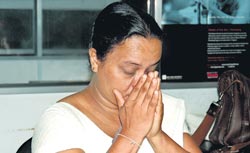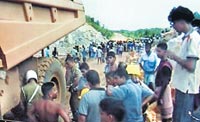
Life has a price — Rs. 550,000The story of Anoma, whose husband died while working for a multinational construction company, highlights the urgent need to amend the law in keeping with real-life issues. Is the Workmen’s Compensation Ordinance a miscarriage of justice? The breadwinner of this family of four died nearly a year ago. It was an untimely and unexpected death. Even now, his wife's body is wracked by sobs when she recalls what happened to Ranjith Vasantha Kumara Ranasinghe that fateful day of August 27, 2006. “Working as a foreman for the Southern Express Highway Project at Dediwila "9+ 100 worksite" in Elpitiya, my husband was run over by a massive tipper,” sighs 42-year-old Anoma Rathnayake of Horana, now widowed and attempting to feed, clothe and educate her young family, a 16-year-old son who is studying in Grade 12, a good two years away from his Advanced Level, and an eight-year-old daughter who is in Grade 4.
Each month, he would get three days of leave and in April 2006 we went to Sigiriya with the children, says Anoma adding that he was very close to both the son and the daughter. “When he came home the month before he died, he chose the tiles for the bathroom we were building in our new home and told me to get the baases to complete the bathroom before he came home next.” But Ranjith did not come home again.“His body was mangled below the navel,” says Anoma's father, Ben Rathnayake adding that the height of a tyre of the tipper is more than that of a man. The Sunday Times understands that many questions also arise about the safety of workers of the Kumagai Gumi Company Ltd., a Japanese company, which is handling work on the Southern Express Highway Project. Is there an ambulance or a team who can give first-aid if an accident occurs at a site of the project, is a crucial question many employees ask. Now Ranjith’s family not only has to deal with the loss of a good, hardworking husband and loving father and come to terms with the sorrow that he is gone, but also find to their utter dismay that their one and only income, which came in the form of his salary, has dried up. What of compensation if he met with this terrible death while on duty? The red tape took over after the funeral, says Anoma. Many forms had to be filled out and finally a month after his death, the family was able to secure the death certificate and hand it over to the Kumagai Company. Then at the end of November 2006, they got a letter from Sri Lanka Insurance that they were entitled to Rs. 550,000 as compensation for the life of their breadwinner.
This was the pathetic total compensation, the highest any workman is entitled to, under the Workmen’s Compensation Ordinance. But even that is not given in full. Anoma has been doled out Rs. 275,000, as the share of the wife. The balance Rs. 275,000, divided into exact half-shares, would be handed over to the children only when they each reach the age of 18. The wife's share of the compensation went into the bank on January 22, 2007, about five months after Ranjith's death.“My husband was getting around Rs. 25,000 and each month he would give me Rs. 20,000 for the running of the home,” she says, explaining that even if she places the Rs. 275,000 in a deposit that gives an interest rate of 10%, which is highly unlikely, she would get less than Rs. 2,300 a month. Unable to live on the interest, if she withdraws around Rs. 10,000 a month after cutting corners drastically, how long would she be able to stretch the Rs. 275,000? Twenty-seven months or just over two years. “I will do something, like sewing, to meet our food and daily costs and manage somehow. But how am I to educate my son and daughter? Please think of the costs — van fees, school fees, books, uniforms and what about tuition? Should I pull them out of school? Isn't their father dying a big sorrow for them, will they have to face more hardship in the form of not going to school,” she asks desperately. The logical question would be: What is also the point in having Rs. 137,500 in each child's name if they starve to death or if they cannot get a proper education? What is the point in getting that amount at 18, if they have left school without completing their education and are struggling to survive? “In this Democratic Socialist Republic of Sri Lanka, where much lip service is paid to children’s rights and welfare, what a mockery this is,” says Mr. Rathnayake. They have sent many letters to many people in authority including President Mahinda Rajapaksa and the Human Rights Commission. “The Human Rights Commission sent us a letter back telling us to place the money in a deposit which gives a higher interest,” he says angrily. “These children's father worked for a project that is of immense importance to the country and died while on duty. Doesn't anyone care? Isn't anyone responsible? What of all the other families in which the breadwinner has died — they must be on the street, dying of starvation or begging.” In a country where leaders and politicians are moving around in vehicles that cost millions of rupees, aren't families like those of Ranjith entitled to a bit more so that the children he has left behind can find their feet with a proper education? Justice and a reasonable means of living are all that these fatherless children are seeking to live with some dignity.
|
|| Front
Page | News | Editorial | Columns | Sports | Plus | Financial
Times | International | Mirror | TV
Times | Funday
Times || |
| |
Copyright
2007 Wijeya
Newspapers Ltd.Colombo. Sri Lanka. |

